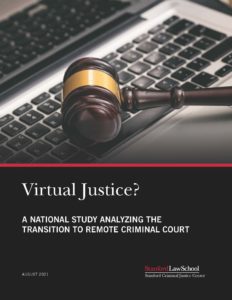Impact of COVID-19 on Indigent Defense Services
As a result of COVID-19, most jurisdictions in the country quickly moved court and court-related communications from in-person to audio- and video-technology. Providers of indigent defense services have identified concerns associated with this transition, including the effect it has on attorney-client relationships and confidentiality and the ability of clients to access reliable technology. In partnership with National Association of Criminal Defense Lawyers (NACDL) and with the involvement of Stanford Sociology Professor Matthew Clair, the Stanford Criminal Justice Center conducted a national survey on the uses, dynamics and effects of remote technology at different stages of criminal proceedings in light of COVID-19. The national quantitative survey included 240 defense attorneys who practice in state court. The qualitative portion of the study involved in-depth interviews with nearly 60 judges, prosecutors, defense attorneys, and court administrators in three jurisdictions (Miami-Dade County (FL), Milwaukee County (WI), and the Northeast Judicial District of North Dakota) to assess how technology is being used, develop best practices, and identify the effects such technology has on the criminal legal system.

